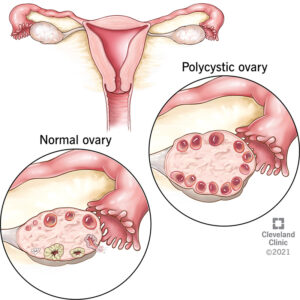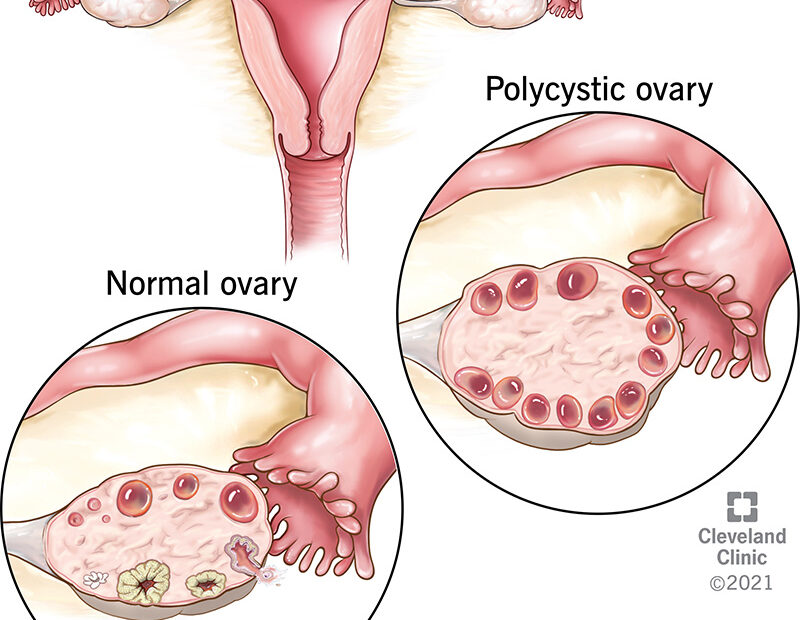Polycystic Ovary Syndrome (PCOS) is a common hormonal disorder that affects women of reproductive age. While the name suggests the presence of cysts on the ovaries, PCOS is a complex condition involving hormonal imbalances that can lead to a range of symptoms and potential long-term health issues. Understanding PCOS is the first step towards managing it effectively and living a healthy, fulfilling life.
What Exactly is PCOS?
PCOS is characterized by an imbalance of reproductive hormones. Women with PCOS often have higher than normal levels of androgens (male hormones). This hormonal imbalance can disrupt the normal development and release of eggs from the ovaries (ovulation). As a result, the ovaries may develop numerous small follicles (immature eggs) that don’t mature or release eggs regularly. These follicles can sometimes appear as cysts on the ovaries, hence the name.
However, it’s crucial to remember that not all women with PCOS have cysts on their ovaries, and not all women with ovarian cysts have PCOS. The diagnosis of PCOS is based on a combination of factors, which are often referred to as the Rotterdam criteria:
- Irregular or absent periods (ovulation dysfunction): This is a hallmark symptom, indicating that the ovaries aren’t releasing eggs consistently.
- Signs of high androgens: This can manifest as excess facial and body hair (hirsutism), acne, and male-pattern baldness. Blood tests can also confirm elevated androgen levels.
- Polycystic ovaries on ultrasound: The presence of 12 or more follicles on at least one ovary, or an increased ovarian volume.
A diagnosis of PCOS typically requires the presence of at least two of these three criteria, and other conditions with similar symptoms must be ruled out.
Common Symptoms of PCOS:
The symptoms of PCOS can vary significantly from woman to woman in terms of both type and severity. Some of the most common symptoms include:
- Irregular menstrual cycles: Periods may be infrequent, prolonged, or absent altogether.
- Heavy or prolonged bleeding: When periods do occur, they can sometimes be unusually heavy or last longer than normal.
- Hirsutism: Excessive hair growth on the face, chin, chest, abdomen, or back.
- Acne: Often persistent and can be severe.
- Oily skin: Increased sebum production due to higher androgen levels.
- Weight gain or difficulty losing weight: Metabolic changes associated with PCOS can make weight management challenging.
- Darkening of the skin (acanthosis nigricans): Dark patches may appear in skin folds, such as the neck, groin, and underarms.
- Hair thinning or male-pattern baldness: Hair loss from the scalp.
- Infertility: Irregular or absent ovulation can make it difficult to conceive.
- Small cysts on the ovaries: Detected during an ultrasound.
- Anxiety and depression: Hormonal fluctuations and the challenges of living with a chronic condition can impact mental health.
- Sleep apnea: Disrupted breathing during sleep is more common in women with PCOS, especially those who are overweight.

The Underlying Causes: A Complex Picture
The exact cause of PCOS isn’t fully understood, but it’s believed to be a combination of genetic and environmental factors. Several factors are thought to play a role:
- Insulin resistance: Many women with PCOS have insulin resistance, meaning their body’s cells don’t respond effectively to insulin. This can lead to higher insulin levels, which can then stimulate the ovaries to produce more androgens.
- High androgen levels: Elevated levels of male hormones can prevent the ovaries from releasing eggs regularly and contribute to symptoms like hirsutism and acne.
- Inflammation: Chronic low-grade inflammation has been linked to PCOS.
- Genetics: There’s evidence that PCOS can run in families, suggesting a genetic predisposition.
The Long-Term Health Implications of PCOS:
Living with PCOS can increase the risk of developing several other health conditions, including:
- Type 2 diabetes: Insulin resistance is a major risk factor.
- Gestational diabetes: Diabetes that develops during pregnancy.
- Heart disease: PCOS can contribute to high cholesterol and high blood pressure.
- Endometrial cancer: Irregular periods can lead to a buildup of the uterine lining, increasing the risk of cancer.
- Sleep apnea: As mentioned earlier, this sleep disorder is more prevalent in women with PCOS.
- Non-alcoholic fatty liver disease (NAFLD): A condition where fat builds up in the liver.
- Mental health disorders: Higher rates of anxiety and depression are observed in women with PCOS.
Managing PCOS: A Personalized Approach
While there’s no single “cure” for PCOS, the condition can be effectively managed through a personalized approach that focuses on addressing individual symptoms and reducing long-term health risks. Management strategies may include:
- Lifestyle modifications: This often forms the cornerstone of PCOS management and includes:
- Healthy diet: Focusing on whole foods, lean protein, and complex carbohydrates can help improve insulin sensitivity and manage weight.
- Regular exercise: Physical activity can improve insulin sensitivity, help with weight management, and boost mood.
- Medications: Depending on the specific symptoms and goals, doctors may prescribe medications such as:
- Birth control pills: To regulate menstrual cycles and reduce androgen levels.
- Anti-androgen medications: To help with hirsutism and acne.
- Metformin: To improve insulin sensitivity.
- Fertility medications: To help with ovulation for women trying to conceive.
- Assisted reproductive technologies (ART): For women facing infertility, options like in vitro fertilization (IVF) may be considered.
- Mental health support: Therapy or medication may be helpful for managing anxiety and depression.
Living Well with PCOS:
While a PCOS diagnosis can feel overwhelming, it’s important to remember that many women with PCOS live healthy and fulfilling lives. Early diagnosis, proactive management, and a strong support system are key. By understanding the condition, adopting healthy lifestyle habits, and working closely with healthcare professionals, women with PCOS can effectively manage their symptoms, reduce their risk of long-term complications, and thrive.
If you suspect you may have PCOS, it’s crucial to consult with a doctor for proper diagnosis and personalized management strategies. You are not alone, and there are resources and support available to help you navigate your journey with PCOS.
